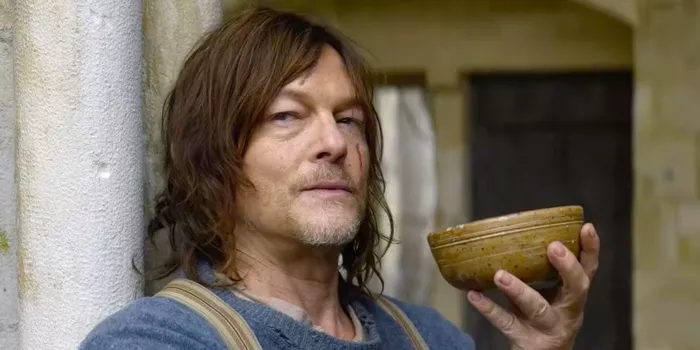The world of “The Walking Dead” is undoubtedly grim and fraught with peril, but every now and then, the show manages to infuse moments of unexpected charm and nostalgia. In the recent Daryl Dixon episode 2, viewers were treated to one such moment when the children used the phrase “Nanu Nanu” during their teacher’s funeral. This seemingly whimsical reference holds deeper meaning, offering insights into the characters’ limited exposure to pop culture and their connection to a bygone era. Moreover, “Nanu Nanu” carries personal significance for Daryl Dixon, evoking cherished memories from a time before the zombie apocalypse.
A Blast from the Past: “Nanu Nanu” and Mork & Mindy
“Nanu Nanu” is not a phrase you’d typically expect to hear in a post-apocalyptic world infested with zombies. However, in Daryl Dixon episode 2, this peculiar expression takes center stage. “Nanu Nanu” is, in fact, a reference to the classic 1970s sitcom “Mork & Mindy,” starring Robin Williams as Mork, an alien from the planet Ork.
In the show, Mork often used “Nanu Nanu” as a greeting or a way to express agreement. It became an iconic catchphrase of the character and left an indelible mark on pop culture. But in the context of “The Walking Dead,” it serves as a reminder of the stark contrast between the past and the present. The fact that the children use this phrase underscores their limited exposure to the broader world of pop culture, suggesting that “Mork & Mindy” might define their understanding of the English language more than any contemporary references.
Pop Culture as a Time Capsule: The Kids’ Connection to the Past
The use of “Nanu Nanu” by the children in the episode not only showcases their innocence and naivety in a world dominated by danger but also highlights the power of pop culture as a time capsule. In their post-apocalyptic existence, these kids find themselves living in a world that has drastically changed from the one their parents or guardians once knew. The fact that “Mork & Mindy” endures as part of their lexicon speaks to the enduring legacy of pop culture and its ability to bridge generations.
For these children, “Mork & Mindy” may be more than just a television show; it’s a connection to a world that existed before the chaos of the zombie apocalypse. In a sense, it becomes a thread that ties them to a sense of normalcy and nostalgia, despite the horrors that surround them.
Daryl Dixon’s Personal Connection: “Nanu Nanu” and His Brother Merle
While the children’s use of “Nanu Nanu” may seem out of place in the harsh world of “The Walking Dead,” it holds a deeper, personal significance for Daryl Dixon. Viewers familiar with Daryl’s backstory know that he had a complicated and fraught relationship with his brother Merle. However, in the midst of their tumultuous interactions, they shared moments of camaraderie and happiness.
One such moment was watching “Mork & Mindy” together. The phrase “Nanu Nanu” was a shared joke between the brothers, a small but precious memory of better times. In the episode, as Daryl hears the children using this phrase, it serves as a poignant reminder of his past and the connection he had with Merle before he lost him. It’s a subtle and touching moment that adds depth to Daryl’s character and reminds us of the human side of these survivors in a world overrun by the undead.
In Conclusion: “Nanu Nanu” – A Glimpse into the Layers of “The Walking Dead”
In the world of “The Walking Dead,” where survival often takes precedence over everything else, it’s the small, unexpected moments like the use of “Nanu Nanu” that remind us of the humanity and complexity of the characters. This seemingly whimsical reference to a 1970s sitcom not only reflects the children’s limited exposure to pop culture but also serves as a time capsule connecting them to a world that no longer exists.
For Daryl Dixon, “Nanu Nanu” holds a bittersweet significance, invoking memories of his brother Merle and a shared moment of laughter in the face of adversity. It’s a testament to the layers and depth of storytelling that “The Walking Dead” continues to offer, even as it explores the bleakest corners of a post-apocalyptic world.

